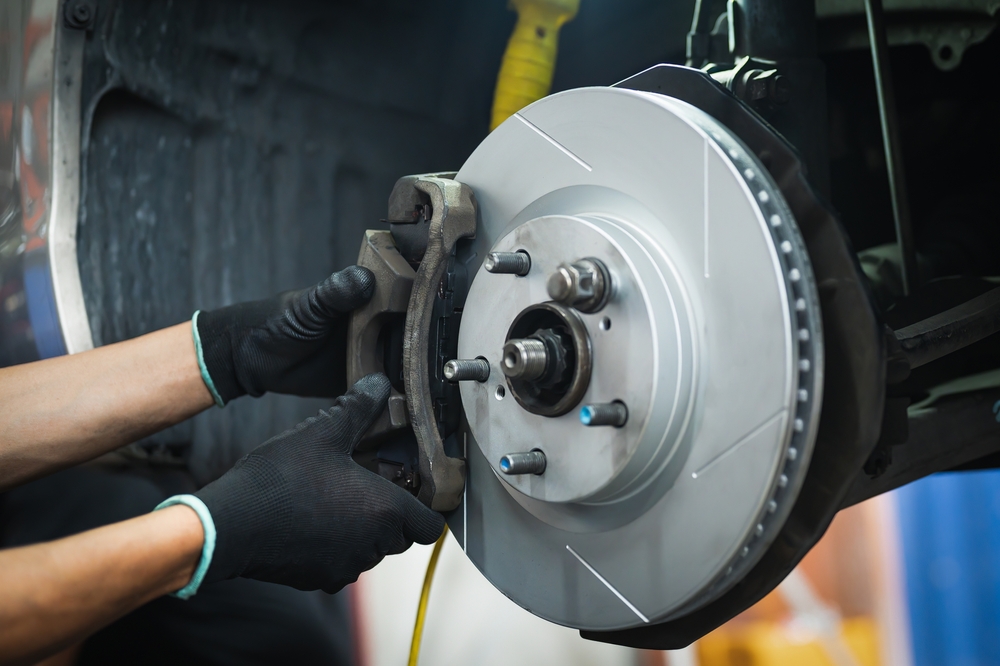Brake Pads: How to Increase the Life Span & When to Replace?

Brakes are one of the most critical safety components in any vehicle. They allow you to stop safely, go through traffic smoothly, and avoid accidents. But like all car parts, brake pads wear down over time and eventually need replacing.
So, how long brake pads last? And when should you consider replacing them?
The answer isn’t straightforward. The lifespan of brake pads depends on various factors. Including driving habits, road conditions, vehicle type, and quality of the pads themselves.
At Morley Tyre Centre, we understand the importance of reliable brakes. We offer brake pad replacement, inspections, and complete vehicle servicing. That can keep you safe and worry-free on the road.
If you are confused about when to replace brake pads or how to make them last longer. This guide from Morley Tyre Centre will answer all your questions.
Let’s get started.
How Long Do Brake Pads Last?
If we talk about the average lifespan. Brake pads last between 30,000 and 70,000 kilometres, but this number can vary widely. Some high-performance pads last longer. While others wear out quickly due to aggressive driving or tough road conditions.
Regular maintenance, driving habits, and other factors are also involved in determining the longevity of brake pads. Let’s discuss them one by one so you can find the exact lifespan of your tyres.
Factors That Affect Brake Pad Lifespan
Several factors impact how long your brake pads last. Understanding them can help you adjust your driving habits and extend the life of your brakes.
They include:
1. Your Driving Environment
Where and how you drive significantly affects the longevity of your brake pads.
- City Driving: If you drive in urban areas like Morley or Perth, constant stop-and-go traffic puts extra stress on your brakes. Frequent braking wears down disc brake pads faster than highway driving.
- Highway Driving: Cars driven mostly on highways have brake pads lasting longer because there are fewer stops & smooth roads.
- Hilly or Mountainous Areas: If you drive downhill, you’ll naturally use your brakes more, leading to faster wear. In such cases, it’s best to use engine braking to reduce strain on your brake pads.
Also Read: An Extensive Guide to All Terrain 4WD & SUV Tyres By Experts
2. Brake Pad Material
The material plays a huge role in durability and performance of brake pads. That eventually affects their life span.
- Organic Brake Pads: Made from rubber, glass, and Kevlar. These are softer and wear out faster. They are also quieter but don’t perform as well under heavy braking.
- Semi-Metallic Brake Pads: A mix of metal fibres and resin. They offer better durability and stopping power. However, they wear out the brake rotors faster.
- Ceramic Brake Pads: Found in high-performance and luxury cars. Ceramic brake pads are durable, quiet, and resistant to heat. However, they can be expensive.
3. Vehicle Load and Weight
The weight of vehicle as well as load being carried on it affects the brake pads. A heavier vehicle places more pressure on the brake pads, causing them to wear out quickly.
If you frequently carry heavy loads or tow trailers. Your brake pads will require more frequent replacement.
Also Read: How to Choose the Right Truck Tyres for Heavy Loads?
Now, let’s discuss some expert driving tips to delay the brake pad replacement.
How to Make Your Brake Pads Last Longer?
You can enhance the longevity of disc brake pads with regular maintenance and smart driving habits.
Here are six tips that can keep your brake pads in top shape & make them last longer.:
1. Don’t Overload Your Vehicle
If you regularly carry heavy cargo or passengers, your brakes have to work harder to slow the vehicle. Avoid excessive load carriage when possible. Especially in smaller cars with standard disc brake pads.
2. Drive Smoothly and Avoid Sudden Braking
Frequent harsh braking wears out brake pads quickly. Avoid heavy traffic areas as much as possible. Try to anticipate stops and apply gradual pressure on the brake pedal. This reduces stress on the brake pads and extends their life.
3. Use Engine Braking on Hills
When driving downhill, don’t rely solely on your brakes. Instead, shift to a lower gear and let the engine slow the car. This reduces the strain on your brake pads, preventing excessive wear and overheating.
4. Avoid Riding the Brakes
Some drivers keep their foot lightly on the brake pedal while driving, especially on highways. This creates unnecessary friction, wearing down the brake pads faster. You should only apply the brakes when needed.
5. Don’t Switch Gears from Reverse to Drive Without Stopping
A common mistake is switching from reverse to drive while the car is still moving. This puts stress on both the transmission and the brake pads, causing unnecessary wear. Always come to a complete stop before changing gears.
6. Get Regular Brake Inspections
Routine brake checks can identify brake pad wear before it becomes a problem. At Morley Tyre Centre, we offer thorough brake inspections and brake pad replacement services to enhance your safety on the road.
Checking your brake pads during routine servicing can help catch wear before it becomes a safety issue. Some signs can further confirm the need for a thorough inspection. Read on to find out about them.
Signs It’s Time to Replace Your Brake Pads
Knowing when to replace brake pads is crucial for maintaining optimal braking performance. Here are some common warning signs that can help.
Sign of Brake Pad Wear | Description |
Squeaking or Squealing Sounds | If you hear a high-pitched noise when braking, it’s a sign that your brake pads are worn down. Many disc brake pads have built-in indicators that produce this sound when it’s time for a replacement. |
Grinding Noises | A grinding noise when braking means your brake pads are completely worn out, and the metal backing is rubbing against the brake rotor. This can cause serious damage to your braking system and should be fixed immediately. |
Longer Stopping Distances | If your car takes longer to stop than usual, your brake pads have become too thin. This reduces braking efficiency and increases the risk of accidents. |
Vibration or Pulsation When Braking | If your brake pedal vibrates when you apply the brakes, it could indicate warped rotors or uneven brake pad wear. Either way, it’s time for a professional inspection. |
Warning Light on Dashboard | Some modern cars have sensors that detect brake pad wear. If your brake warning light comes on, don’t ignore it. Schedule a brake inspection as soon as possible. |
If any of these signs appear and you suspect your brake pads need replacing. Don’t wait. Arrange a professional brake assessment & replace them if needed. Because worn-out brakes can compromise your safety.
Need A Brake Pad Replacement or A Thorough Inspection?
Trust Morley Tyre Centre for Reliable Brake Services
At Morley Tyre Centre, we specialise in brake pad replacement, inspections, and full vehicle servicing. Our expert team has been keeping drivers safe in Morley, Pianella, Noranda, Bayswater, Bedford, and Bassendean for over a decade.
Whether you need new disc brake pads. Want a brake fluid check. Or looking for a full brake system inspection. We’ve got you covered.
Book your brake pad replacement today and drive with confidence!
